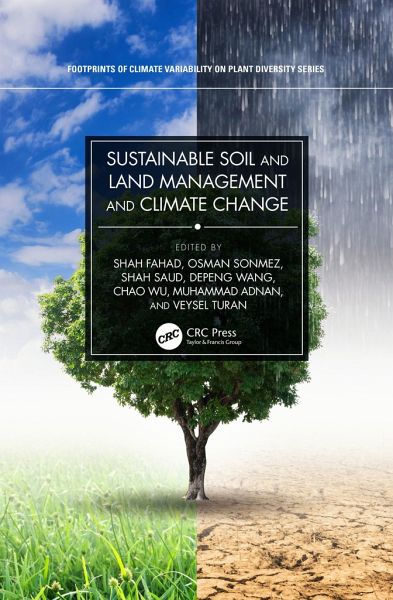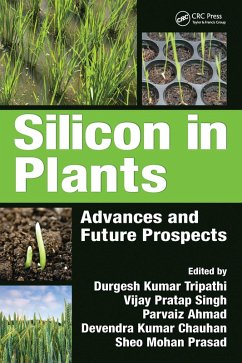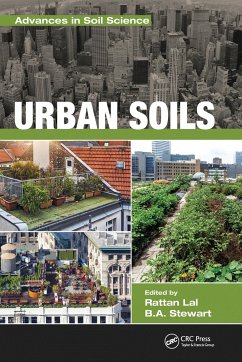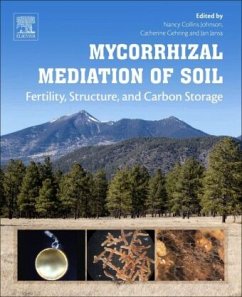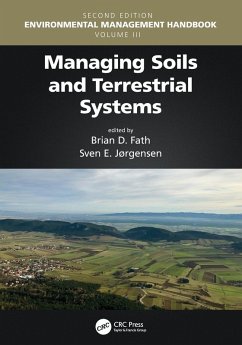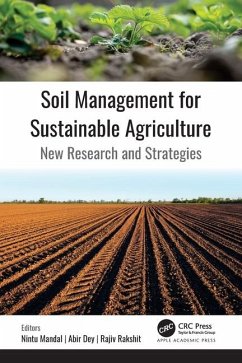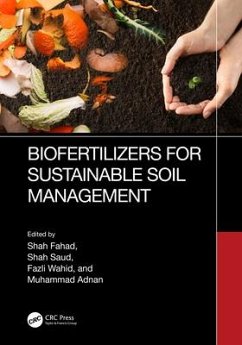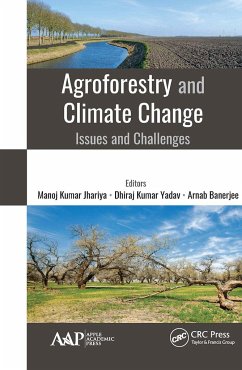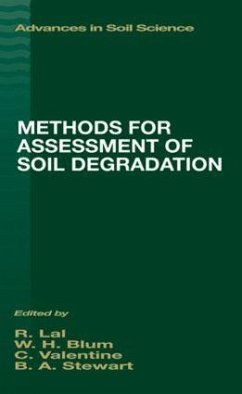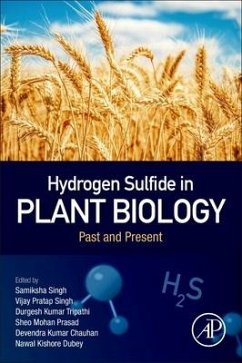Gebundenes Buch
Sustainable Soil and Land Management and Climate Change
Versandkostenfrei!
Versandfertig in 1-2 Wochen
Weitere Ausgaben:

PAYBACK Punkte
94 °P sammeln!




The third volume of Sustainable Soil and Land Management and Climate Change presents a complete overview of plant soil interactions in a climate affected by greenhouse gas emissions and organic carbon. It presents approaches and managements strategies for the stabilization of soil organic matter.
Dr Shah Fahad is an Assistant Professor in the Department of Agronomy, University of Haripur, Khyber Pakhtunkhwa, Pakistan. He obtained his PhD in Agronomy from Huazhong Agriculture University, China, in 2015. After doing his postdoctoral research in Agronomy at the Huazhong Agriculture University (2015-17), he accepted the position of Assistant Professor at the University of Haripur. He has published over 260 peer-reviewed papers (Impact factor 723.45) with more than 230 research and 30 review articles, on important aspects of climate change, plant physiology and breeding, plant nutrition, plant stress responses and tolerance mechanisms, and exogenous chemical priming-induced abiotic stress tolerance. He has also contributed 50 book chapters to various book editions published by Springer, Wiley-Blackwell, and Elsevier. He has edited fifteen book volumes, including this one, published by CRC press, Springer, and Intech Open. He won Young Rice International Scientist award and distinguish scholar award in 2014 and 2015 respectively. He won 13 projects from international and national donor agencies. Dr Shah Fahad name has figured among the top two percent scientists in a global list compiled by the Stanford University,USA. He has worked and is presently continuing on a wide range of topics, including climate change, greenhouse emission gasses, abiotic stresses tolerance, roles of phytohormones and their interactions in abiotic stress responses, heavy metals, regulation of nutrient transport processes. Prof. Dr. Osman Sönmez is a Professor in the Department of Soil Science, Faculty of Agriculture, Erciyes University, Kayseri, Turkey. He obtained his MS and PhD in Agronomy from Kansas State University, Manhattan-KS, USA in 1996-2004. In 2014 he accepted the position of Associate Professor at the University of Erciyes. Since 2014, he has worked in Department of Soil Science, Faculty of Agriculture at Erciyes University. He has published over 90 as peer-reviewed papers, research and review articles on soil pollution, plant physiology and plant nutrition. Dr. Veysel Turan is an Assistant Professor in the Department of Soil Science and Plant Nutrition, Bingöl University, Turkey. He obtained his PhD in Soil Science and Plant nutrition from Atatürk University, Turkey, in 2016. After doing his postdoctoral research in Department of Microbiology, University of Innsbruck, ,Austria (2017-18), he is working in Bingöl University. He has worked and is presently continuing on a wide range of topics, soil-plant interaction, and heavy metal accumulation, bioremediation of soil by some plant and soil amendment. Dr. Muhammad Adnan is a lecturer in the Department of Agriculture at the University of Swabi (UOS), Pakistan. He has completed his PhD (soil fertility and microbiology) from the Department of Soil and Environmental Sciences (SES) the University of Agriculture Peshawar, Pakistan and Department of Plant, Soil and Microbial Sciences, Michigan State University, USA. He has received his MSc and BSc (Hons) in Soil and Environmental Sciences, from Department of SES the University of Agriculture, Peshawar-Pakistan. Dr. Shah Saud received his Ph.D. in Turf grasses (Horticulture) from Northeast Agricultural University, Harbin, China. He is currently working as a Post Doctorate researcher in department of Horticulture, Northeast Agricultural University, and Harbin, China. Dr. Shah Saud has published over 125 research publications in peer-reviewed journals. He has edited 3 books and written 25 book chapters on important aspects of plant physiology, plant stress responses, and environmental problems in relation to agricultural plants. According to Scopus®, Dr. Shah Saud's publications have received roughly 2500 citations with an h-index of 24. Dr. Chao Wu engages in the field crop cultivation and physiology, and plant phenomics. He has completed his Ph.D during 2013-2016 from Huazhong Agricultural University, Wuhan, China, and completed his post Ph.D during 2017-2019 from Nanjing Agricultural University, Nanjing, China. Now, he is associate research fellow in Guangxi Institute of Botany, Guangxi Zhuang Autonomous Region and the Chinese Academy of Sciences, Guilin, China. He chairs a Natural Science Foundation of Jiangsu Province, and two Postdoctoral Science Foundation researches, and focus mainly on physiological mechanisms of abiotic-stress tolerance (heat, drought) in crops and medicinal plants. Dr. Depeng Wang has completed Ph.D. in 2016 in the field of Agronomy and Crop Physiology from Huazhong Agriculture University, Wuhan, China. Presently he is serving as a professor in College of Life Science, Linyi University, Linyi, China. He is the principal investigator of Crop Genetic Improvement, Physiology & Ecology Center in Linyi University. His current research focus on crop ecology and physiology, agronomy. Such as the key characteristics associated with high yielding crop, the effect of temperature on crop grain yield and solar radiation utilization, morphological plasticity to agronomic manipulation in leaf dispersion and orientation, optimal integrated crop management practices for maximizing crop grain yield. Dr. Depeng Wang has published over 36 papers in reputed journals.
Produktdetails
- Footprints of Climate Variability on Plant Diversity
- Verlag: Taylor & Francis Ltd
- Seitenzahl: 196
- Erscheinungstermin: 24. Juni 2021
- Englisch
- Abmessung: 260mm x 183mm x 15mm
- Gewicht: 560g
- ISBN-13: 9780367623180
- ISBN-10: 0367623188
- Artikelnr.: 69703336
Herstellerkennzeichnung
Libri GmbH
Europaallee 1
36244 Bad Hersfeld
gpsr@libri.de
Für dieses Produkt wurde noch keine Bewertung abgegeben. Wir würden uns sehr freuen, wenn du die erste Bewertung schreibst!
Eine Bewertung schreiben
Eine Bewertung schreiben
Andere Kunden interessierten sich für



